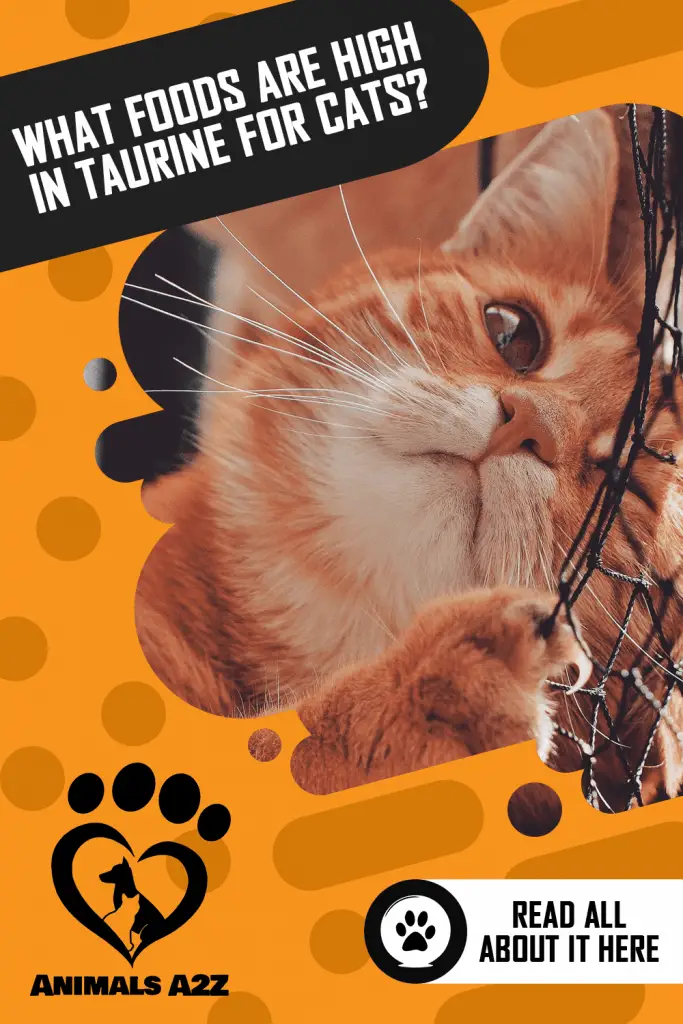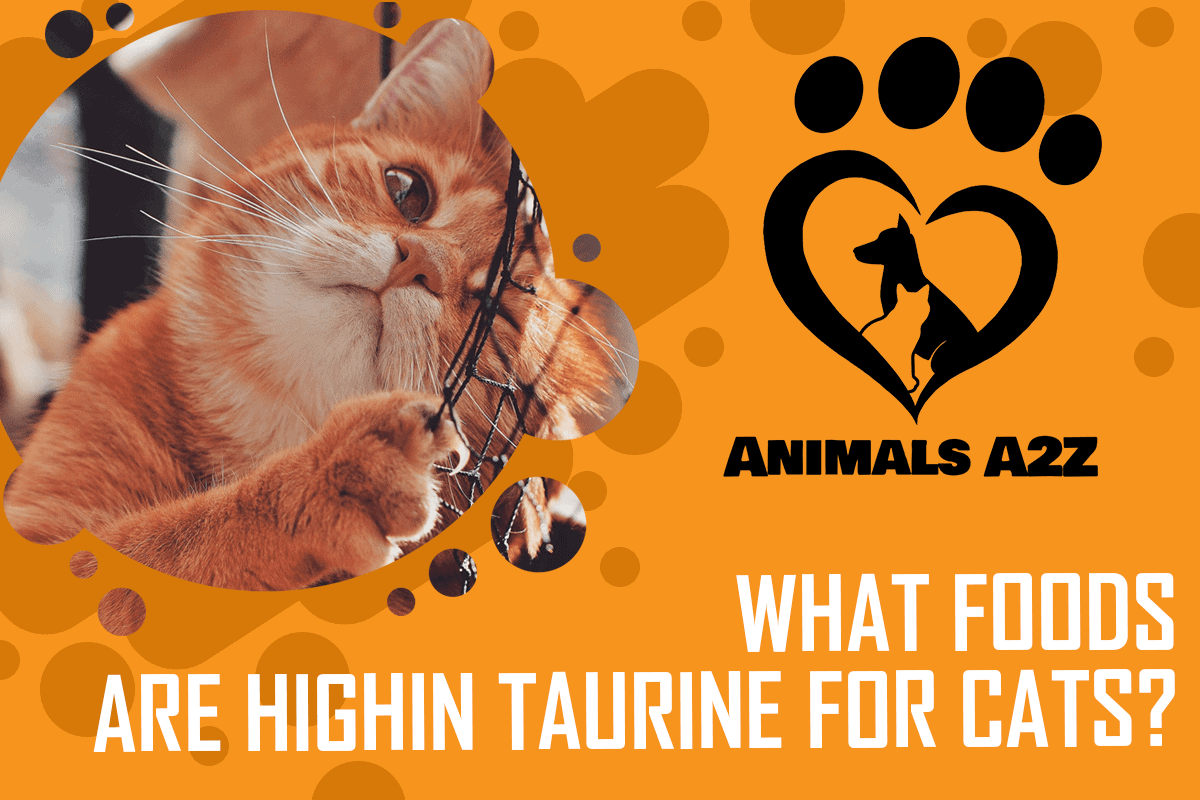Taurine is one of the amino acids that cats require to be healthy. It’s a very important amino acid for cats since their bodies can’t synthesize it, thus, it should be acquired from their diet. Taurine is necessary for your cat’s nerves, heart, eyes, digestion, brain, fetal development, and immune function.
DCM or dilated cardiomyopathy in cats is often associated with low taurine levels.
Table of Contents
Where does taurine come from for cats?
Taurine should be an important part of a cat’s diet because they have a limited ability to manufacture. Taurine from cats mainly comes from meat. Some meat contains more taurine than others, so if you want extra taurine for your cat, it is good to be aware of this.
Fish and meat with a high percentage of taurine.
Fish and shellfish:
- Scallops: 827.7mg per 100g
- Squid: 356.7mg per 100g
- Oysters: 70mg per 100g
- Mussels: 39.4mg per 100g
- Clams: 240mg per 100g
- Whitefish: 113.9mg per 100g
- Tuna: 39mg per 100g
- Cod: 31mg per 100g
Meat:
- Turkey: 306 mg per 100g
- Chicken liver: 110mg per 100g
- Chicken: 82.6mg per 100g
- Beef liver: 68.8mg per 100g
- Beef heart: 63.2mg per 100g
- Beef: 43.1mg per 100g
- Lamb: 43.8mg per 100g
- Turkey: 29.6mg per 100g
- Chicken: 17.5mg per 100g
All the above numbers migth change a bit when if it is cooked.
Read this too: Some of the worst cat foods without enough taurine.
Where Does Taurine Come From?
Naturally, taurine occurs in meat and a lot of companies also add extra taurine to their foods since up to fifty percent can be lost during cooking. If you’re looking for more taurine source for your cat’s diet, here’s a list of products you can add as treats.
Ingredients that are used in a cooked or canned product will have lesser taurine content than a raw or freeze-dried product.
Taurine Deficiency can be very detrimental to the health of your cat and cause heart or growth problems, blindness, and nervous system deficiencies. To meet the needs of your cat, you have to externally provide him with taurine, which is found in food.
Why Taurine is the Best Ally for the Health of Your Cat
Taurine is a very important component that all store-bought cat food should contain it. Taurine is naturally found in natural origin proteins and not in synthesized proteins. Below, we have listed the benefits of this amino acid for your cat’s health.
- It stimulates muscle growth
- It is an antioxidant
- It helps in the production of bile
- It regulates salt and water in cells
- It helps your cat have a good eyesight
- It acts as a neurotransmitter
Does Commercial Food for Cats Contain Taurine?
Commercial cat foods contain good levels of taurine. But it must be as natural and high-end as possible. Fortunately, some really good feeds are made from high-quality dehydrated meat. Bear in mind that low-quality cat food is a really bad choice for your cat in terms of taurine content.
This kind of feed is made with little natural taurine and lots of grains. The taurine that they often use to compensate for the lacking amino acids is usually from other artificial sources.
The moment you are visiting a pet shop or supermarket, it’s essential that you check the ingredients list on the label of the cat food. If you see taurine in the ingredients list, then it’s artificial since it has been added. You should always remember that taurine must already be present in certain natural cat food.
Common Questions About Cat Foods that Contain Taurine
The highest amounts of this amino acid can be found in shellfish like clams, mussels, and scallops. There’s also a high amount of taurine in the dark meat of turkey bologna and turkey. Other food products that contain a high level of taurine are seafood, eggs, beef, and chicken.
Experts suggest that at every meal, your cat must consume between 200 to 300 mg. Dietary supplementation of taurine is usually 250mg given twice a day. This supplementation can reverse taurine deficiency and dilated cardiomyopathy as long as your cat’s condition has been identified early enough by your trusted veterinarian.
6 weeks without enough supplementation of taurine, and symptoms of taurine deficiency become noticeable. However, total irreversible blindness only occurs after a cat is suffering from a long-term taurine deficiency. The moment this type of amino acid is lacking, chances are the retinas eventually degenerate leading to a cat’s blindness.
How do you give taurine to a cat?
You can make sure that your cat gets enough taurine to eat. If you make sure to give your cat food based on animal-protein (meat), then it should usually be easy enough to give taurine to a cat.
Does all cat food have taurine?
Most cat food will have a good amount of taurine. Taurine is found in animal-based proteins, which is the reason you should be sure that most of the cat food is based on real meat, if you are looking for cat food with a lot of taurine.
Conclusion
Now that you know how important Taurine is for your cat, you should consider adding more Taurine content to your cat’s daily diet. Those cat owners who feed raw meat to their feline friends should not worry about Taurine deficiency because of insufficient intake.
Since taurine is a free type of amino acid, it’s easily lost with cooking the food for over 50%. If you really need to cook the meat, make it rare as possibly by searing the outside part so the juices will be locked in.
If the home-made diet for your cat is primarily cooked, vets recommend that you add enough Taurine supplements. The feline Taurine supplement is expensive and the money you save in vet expenses through premium health can pay for itself. Aside from that, you will be rewarded with a long-lived, active, and healthy cat friend.
Taurine supplements may be added to specific cat foods, most especially diets which are formulated for certain needs of cats like development and grown or for heart disease. Taurine supplementation is very safe, with no reports of problems associated with high dietary taurine intake in cats.


